- Home
- Susan Hill
The Small Hand Page 2
The Small Hand Read online
Page 2
IN MY ROOM I sat beside my open window with the sweet smell of the garden drifting in and read what Lady Merriman had found for me.
The article was about a remarkable and ‘important’ garden created at the White House by Mrs Denisa – apparently always known as Denny – Parsons and contained photographs of its creator strolling across lawns and pointing out this or that shrub, looking up into trees. There was also one of those dewy black-and-white portrait photographs popular in such magazines then, of Mrs Parsons in twinset and pearls, and holding a few delphiniums, rather awkwardly, as if uncertain whether or not to put them down. The soft focus made her look powdery and slightly vacant, but I could see through it to a handsome woman with strong features.
The story seemed straightforward. She had been widowed suddenly when her two children were nine and eleven years old and had decided to move from the Surrey suburbs into the country. When she had found the White House it had been empty and with an overgrown wilderness round it, out of which she had gradually made what was said in the reverential article to be ‘one of the great gardens of our time’.
Then came extensive descriptions of borders and walks and avenues, theatre gardens and knot gardens, of fountains and waterfalls and woodland gardens set beside cascading streams, with lists of flowers and shrubs, planting plans and diagrams and three pages of photographs. It certainly looked very splendid, but I am no gardener and was no judge of the relative ‘importance’ of Mrs Parsons’s garden.
The place had become well known. People visited not only from miles away but from other countries. At the time the article was written it was ‘open daily from Wednesday to Sunday for an entrance fee of one shilling and sixpence’.
The prose gushed on and I skimmed some of the more horticultural paragraphs. But I wanted to know more. I wanted to know what had happened next. Mrs Parsons had found a semi-derelict house in the middle of a jungle. The house in the photographs was handsome and in good order, with well-raked gravel and mown grass, fresh paint, open windows, at one of which a pale upstairs curtain blew out prettily on the breeze.
But the wheel had come full circle. When I had found the house and garden they were once again abandoned and decaying. That had happened to many a country house in the years immediately after the war but it was uncommon now.
I was not interested in the delights of herbaceous border and pleached lime. The house was handsome in the photographs, but I had seen it empty and half given over to wind and rain and the birds and was drawn by it as I would never have been by somewhere sunny and well presented.
I set the magazine down on the table. Things change after all, I thought, time does its work, houses are abandoned and sometimes nature reclaims what we have tried to make our own. The White House and garden had had their resurrection and a brief hour in the sun but their bright day was done now.
Yet as I switched out the lamp and lay listening to the soft soughing of the sea, I knew that I would have to go back. I had to find out more. I was not much interested in the garden and house. I wanted to know about the woman who had found it and rescued it yet apparently let it all slip through her fingers again. But most of all, of course, I wanted to go back because of the small hand.
Had Denny Parsons stood there in the gathering dusk, looking at the empty house, surrounded by that green wilderness, and as she made her plans for it felt the invisible small hand creep into her own?
Four
othing happened with any connection to the Merrimans or the part of the world in which they lived, and where I had come upon the White House, for several weeks. My trade was going through a dull patch. It happens every so often and ought not to trouble me, but after a short time without any requests from clients or phone calls about possible treasures I become nervous and irritable. If the dead patch continues for longer, I start wondering if I will have to sell some of my own few treasures, convinced that the bottom has dropped out of the business and I will never be active again. Every time it happens I remind myself that things have never failed to turn round, yet I never seem able to learn from experience.
I was not entirely idle of course. I bought and sold one or two complete library sets, including a first edition of Thomas Hardy, and even wondered whether to take up the request from an American collector to find him a full set of the James Bond first editions, mint and in dust wrappers, price immaterial. This is not my field, but I started to ask about in a desultory way, knowing I was probably the hundredth dealer the man had employed to find the Bonds and the one least likely to unearth them.
The summer began to stale. London emptied. I thought half-heartedly of visiting friends in Seattle.
And then two things happened on the same day.
In the post I received an envelope containing a card and a cutting from an old newspaper.
Mr Snow, I unearthed this clipping about the house, Denny’s House, which you came upon by chance when getting lost on your way to us in June. I thought perhaps you might still be interested as it tells a little story. I am sure there is more and if I either remember or read about it again I will let you know. But please throw this away if it is no longer of interest. Just a thought.
Sincerely, Alice Merriman.
I poured a second cup of coffee and picked up the yellowed piece of newspaper.
There was a photograph of a woman whom I recognised as Denisa Parsons, standing beside a large ornamental pool with a youngish man. In the centre of the pool was a bronze statue at which they were looking in the slightly artificial manner of all posed photographs. The statue was of a young boy playing with a dolphin and a golden ball and rose quite beautifully out of the still surface of the water, on which there were one or two water lilies. There might have been fish but none was visible.
The news item was brief. The statue had been commissioned by Denisa Parsons in memory of her grandson, James Harrow, who had been drowned in what was simply described as ‘a tragic accident’. The man with her was the sculptor, whose name was not familiar to me, and the statue was now in place at ‘Mrs Parsons’s internationally famous White House garden’. That was all, apart from a couple of lines about the sculptor’s other work.
I looked at the photograph for some time but I could read nothing into the faces, with their rather public smiles, and although the sculpture looked charming to me, I am no art critic.
I put the cutting in a drawer of my desk, sent Lady Merriman a postcard of thanks and then forgot about the whole thing, because by the same post had come a letter from an old friend at the Bodleian Library telling me that he thought he might have news of a Shakespeare First Folio which could conceivably be for sale. If I would like to get in touch …
Fifteen minutes later I was in a taxi on my way to Paddington station to catch the next train to Oxford.
Five
haven’t had an extended lunch break for, what, five years? So I’m taking one today.’
It did not surprise me. I have known quite a few librarians across the world, in major libraries and senior posts, and none has ever struck me as likely to take a long lunch, or even in some cases a lunch at all. It is not their way. So I was delighted when Fergus McCreedy, a very senior man at the Bodleian, suggested we walk from there up to lunch at the Old Parsonage. It was a warm, bright summer’s day and Oxford was, as ever, crowded. But in August its crowds are different. Parties of tourists trail behind their guide, who holds up a red umbrella or a pom-pom on a stick so as not to lose any of his charges and language-school students on bicycles replace undergraduates on the same. Otherwise, Oxford is Oxford. I always enjoy returning to my old city, so long as I stay no more than a couple of days. Oxford has a way of making one feel old.
Fergus never looks old. Fergus is ageless. He will look the same when he is ninety as he did the day I met him, when we were both eighteen and in our first week at Balliol. He has never left Oxford and he never will. He married a don, Helena, a world expert on some aspect of early Islamic art, they live in a tiny, immacu
late house in a lane off the lower Woodstock Road, they take their holidays in countries like Jordan and Turkistan. They have no children, but if they ever did, those children would be, as so many children of Oxford academics have always been, born old.
I had not seen Fergus for a couple of years. We had plenty to catch up on during our walk to lunch and later while we enjoyed a first glass of wine at our quiet table in the Old Parsonage’s comfortable dining room. But when our plates of potted crab arrived, I asked Fergus about his letter.
‘As you know, I have a very good client who has set me some difficult challenges in the past few years. I have usually found what he wanted – he’s a very knowledgeable book collector. It’s a pleasure to work with him.’
‘Not one of the get-me-anything-so-long-as-it-costs-a-lot brigade, then.’
‘Absolutely not. I have no idea how much he’s worth or how he made his money, but it doesn’t signify, Fergus, because he loves his books. He’s a reader as well as a collector. He appreciates what I find for him. I know I have a living to earn and money is money, but there are some I could barely bring myself to work for.’
I meant it. I had had an appalling couple of years being retained by a Russian oil billionaire who only wanted a book if it was publicised as being both extremely rare and extremely expensive and who did not even want to take delivery of what I bought for him. Everything went straight into a bank vault.
‘So your man wants a First Folio.’
Our rare fillet of beef, served cold with a new potato and asparagus salad, was set down and we ordered a second glass of Fleurie.
‘I told him it was more or less impossible. They’re all in libraries.’
‘We have three,’ Felix said. ‘The Folger has around eighty. Getty bought one a few years ago of course – that was sold by one of our own colleges.’
‘Oriel. Yes. Great shame.’
Felix shrugged. ‘They needed the money more than the book. I can understand that. A small private library in London with a mainly theological collection, Dr Williams’s Library, sold its copy a year or so back for two and a half million. But that endows the rest of their collection and saves it for the foreseeable future. It’s a question of balancing one thing against another.’
‘If you had a First Folio would you sell it?’
Felix smiled. ‘The one I have in mind as being just possibly for sale does not belong to me. Nor to the Bodleian.’
‘I thought every one of the 230 or so copies was accounted for?’
‘Almost every one. It was thought for some years that apart from all those on record in libraries and colleges and a few in private hands, there was one other First Folio, somewhere in India. But almost by chance, and by following up a few leads, I think I have discovered that that is not the case.’
He helped himself to more salad. The room had filled. I looked at the walls, which were lined with an extraordinary assortment of pictures, oils and watercolours, five deep in places – none of them was of major importance but every single one had merit and charm. The collection enhanced the pleasant room considerably.
‘The Folio was mentioned to me in passing,’ Fergus said, ‘because my German colleague was emailing me about something entirely different, which we have been trying to track down for a long time – a medieval manuscript in fact. In the course of a conversation I had with Dieter, he said almost in passing something like, “They don’t know half of what they do possess, including a Shakespeare First Folio.”’
‘They?’ I said.
Fergus got up. ‘Shall we have our coffee on the terrace? I see the sun has come out again.’
SITTING AT A TABLE under a large awning, we were somewhat protected from the noise of the passing traffic on the Banbury Road and the coffee was first-rate.
Fergus took three gulps of his double espresso. ‘Have you ever heard of the monastery of Saint Mathieu des Etoiles?’
‘I didn’t so much as know there was such a saint.’
‘Not many do. He’s pretty obscure, though there are a couple of churches in France dedicated to him, but so far as I know only one monastery bears his name. It’s Cistercian, an enclosed and silent order, and very remote indeed, a bit like La Grande Trappe – high up among mountains and forests, in its own small pocket of time. In winter it can be completely cut off. There is a village some six miles away, but otherwise it’s as remote from civilisation as you can probably get anywhere in Western Europe. Oh and it also maintains the tradition of wonderful sacred music. A few people do visit – for the music, for a retreat – and the monastery is surprisingly in touch with what you might call our world.’
‘Most of them are,’ I said. ‘I know one in the Appalachian Mountains – remote as they come, but they are on email.’
‘When you think about it, the silent email suits the rule far better than the telephone. Now, a couple of years ago I had the good fortune to visit Saint Mathieu. They have one of the finest and oldest and best-preserved monastic libraries in the world. One of the ways they earn their living is in book restoration and rebinding for other libraries. We’ve used their skills occasionally. You’re wondering what all this has to do with you? More coffee?’
We ordered. The terrace was emptying out now, as lunchtime drew to a close.
‘The monastery, like so many, is in need of money for repairs. When your building dates from the twelfth century things start to wear out. They are not a rich order and the work they do keeps them going, but without anything over and to spare. They urgently need repairs to the chapel frescoes and the roof of the great chapter house, and even though they will provide some of the labour themselves, the monks can’t do it all – they don’t have the skills and, besides, many of them are in their seventies and older. So, after a great deal of difficulty, they have obtained permission to sell one or two treasures – mainly items which don’t have much reason to be there, and which sit rather oddly in a Cistercian monastery. For instance, for some strange reason they have one or two early Islamic items.’
‘Ah – so Helena comes into the picture.’
‘She does. So do we. They have a couple of medieval manuscripts, for instance – an Aelfric, a Gilbert of Hoyland. In each case it was thought only one or possibly two copies existed in the world, but Saint Mathieu turns out to have wonderful examples. They only need to sell a few things to pay for all of their repairs and rebuilding and to provide an endowment against future depredations. They’re pretty prone to weather damage up there, apart from anything else. They need to protect themselves against future extreme winters.’
‘It’s pretty unusual for items like this to come on the market, Fergus. What else have they got? You make me want to get on the next plane.’
He held up his hand. ‘No. “The market” is exactly what they do not want to know about any of this. They made contact with us under a seal of total confidentiality. I’m not supposed to be talking to you, so I’d be obliged if you said nothing either.’
I was put out. Why tell me at all if my hands were going to be tied as well as my lips sealed?
‘Don’t sulk.’ Fergus looked at me shrewdly. ‘I haven’t mentioned this to anyone and I don’t intend to – apart from anything else, there would be no point. But the thing is, they have a Shakespeare First Folio – one that was supposed to be somewhere in India. It has never been properly accounted for and my view is that it isn’t in India at all but in the Monastery of Saint Mathieu des Etoiles.’
‘How on earth did they acquire it?’
He shrugged. ‘Who knows? But in the past when rich young men entered the monastery as postulants their families gave a sort of dowry and it sometimes took the form of art treasures, rare books and so on, as well as of money. That’s probably what happened in this case.’
‘Do they know what they’ve got?’
‘Pretty much. They’re neither fools nor innocents. And they are certainly not to be cheated. No, I know you would not, Adam, but your trade is as open to charlatans as
any other.’
‘I like the way you call it “my” trade.’
‘Oh, don’t look at me,’ Fergus said, smiling slightly. ‘I’m just a simple librarian.’ He stood up. ‘I’ve extended my lunch hour far enough. Are you walking back into town?’
He paid the bill and we turned out of the gate and began to walk towards St Giles.
‘The thing is,’ Fergus said, ‘some of the items they might conceivably sell will go to America – we simply don’t have the money in this country. I am talking to a couple of potential private benefactors but I don’t hold out much hope – they get talked to by the world and his wife. Why should they want to give us a single priceless medieval manuscript when they could build the wing of a hospital or endow a chair in medical research? I can’t blame them. We’ve already got First Folios. So have the other libraries. We none of us need another. But you have a client who could presumably afford three or four million to get what he wants?’
‘He would never have mentioned it to me if he didn’t know how unlikely I was to get one for him, how much it might cost if I ever did and that he could well afford that. He’s a gentleman.’
‘Ah, one of those. Would you like me to get in touch with the monastery and ask one or two discreet questions? I won’t mention your name or anything of that kind – and I’ll have to work up to it. I think I have the way of them now, but I don’t want to pounce or the portcullis will come down.’
‘And they’ll be off to the Huntington Library in a trice.’
Fergus’s mouth firmed slightly. I laughed.
‘You’d all stab one another in the back just as surely as we dealers would,’ I said. ‘But thank you, Fergus. And of course, please put in a word. Whatever it takes.’
‘Yes,’ he said. ‘Don’t call us and all that.’

 Mrs De Winter
Mrs De Winter A Question of Identity
A Question of Identity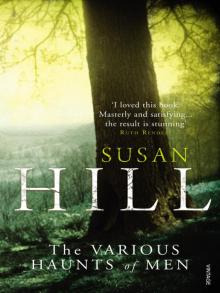 The Various Haunts of Men
The Various Haunts of Men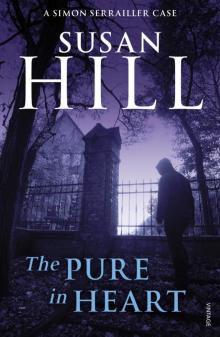 The Pure in Heart
The Pure in Heart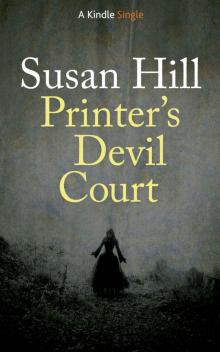 Printer's Devil Court
Printer's Devil Court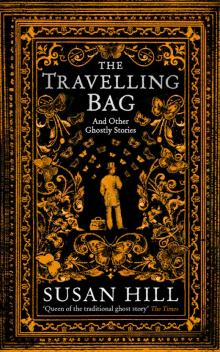 The Travelling Bag
The Travelling Bag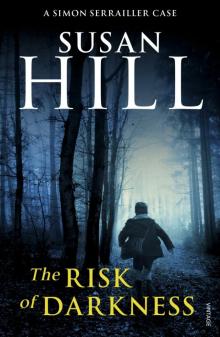 The Risk of Darkness
The Risk of Darkness A Kind Man
A Kind Man Black Sheep
Black Sheep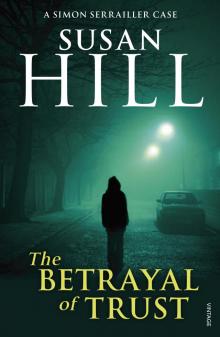 The Betrayal of Trust
The Betrayal of Trust The Service of Clouds
The Service of Clouds Betrayal of Trust
Betrayal of Trust The Small Hand
The Small Hand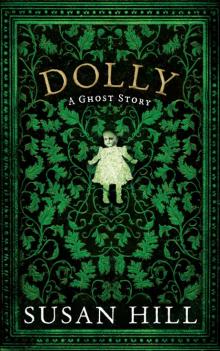 Dolly
Dolly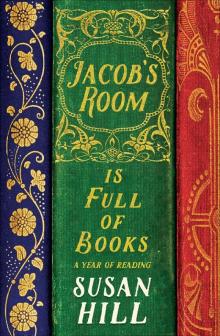 Jacob's Room Is Full of Books: A Year of Reading
Jacob's Room Is Full of Books: A Year of Reading The Vows of Silence
The Vows of Silence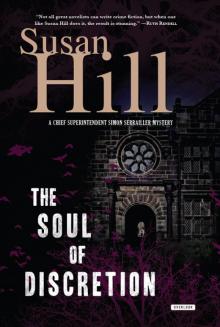 The Soul of Discretion
The Soul of Discretion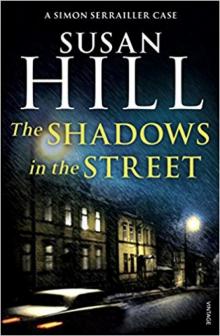 The Shadows in the Street
The Shadows in the Street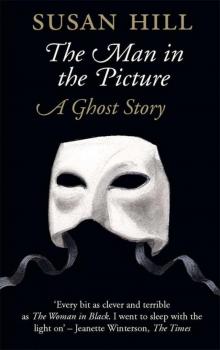 The Man in the Picture
The Man in the Picture Air and Angels
Air and Angels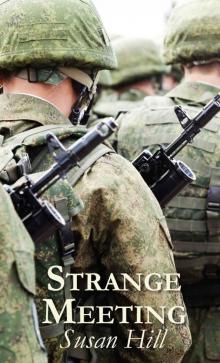 Strange Meeting
Strange Meeting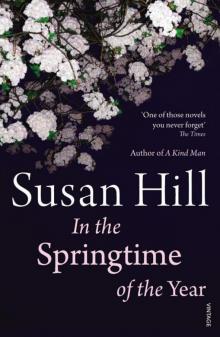 In the Springtime of the Year
In the Springtime of the Year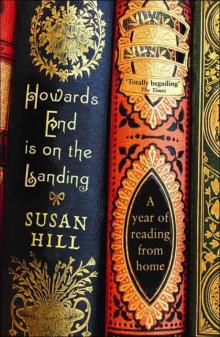 Howards End Is on the Landing: A Year of Reading From Home
Howards End Is on the Landing: A Year of Reading From Home From the Heart
From the Heart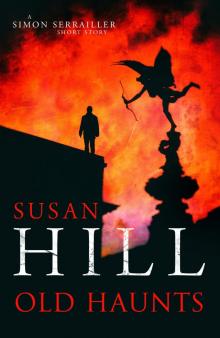 Old Haunts
Old Haunts The Mist in the Mirror
The Mist in the Mirror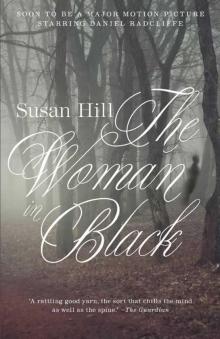 The Woman in Black: A Ghost Story
The Woman in Black: A Ghost Story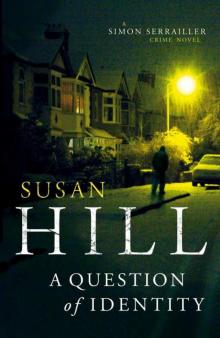 A Question of Identity (Simon Serrailler 7)
A Question of Identity (Simon Serrailler 7)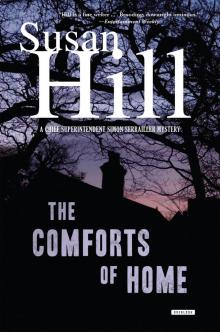 The Comforts of Home
The Comforts of Home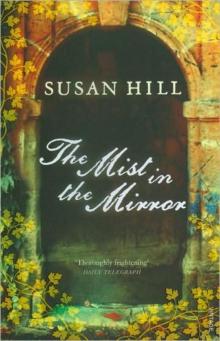 Mist in the Mirror
Mist in the Mirror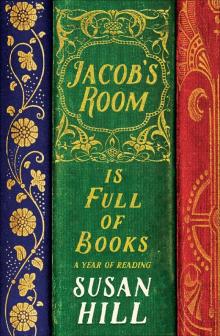 Jacob's Room is Full of Books
Jacob's Room is Full of Books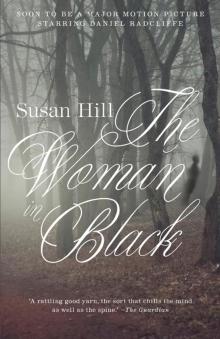 The Woman in Black
The Woman in Black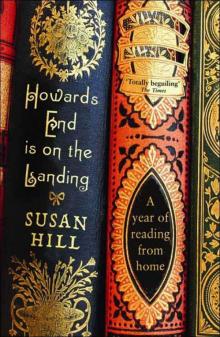 Howards End is on the Landing
Howards End is on the Landing